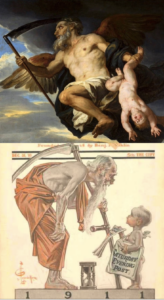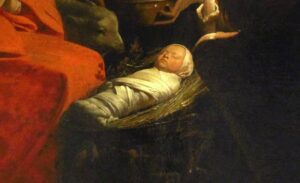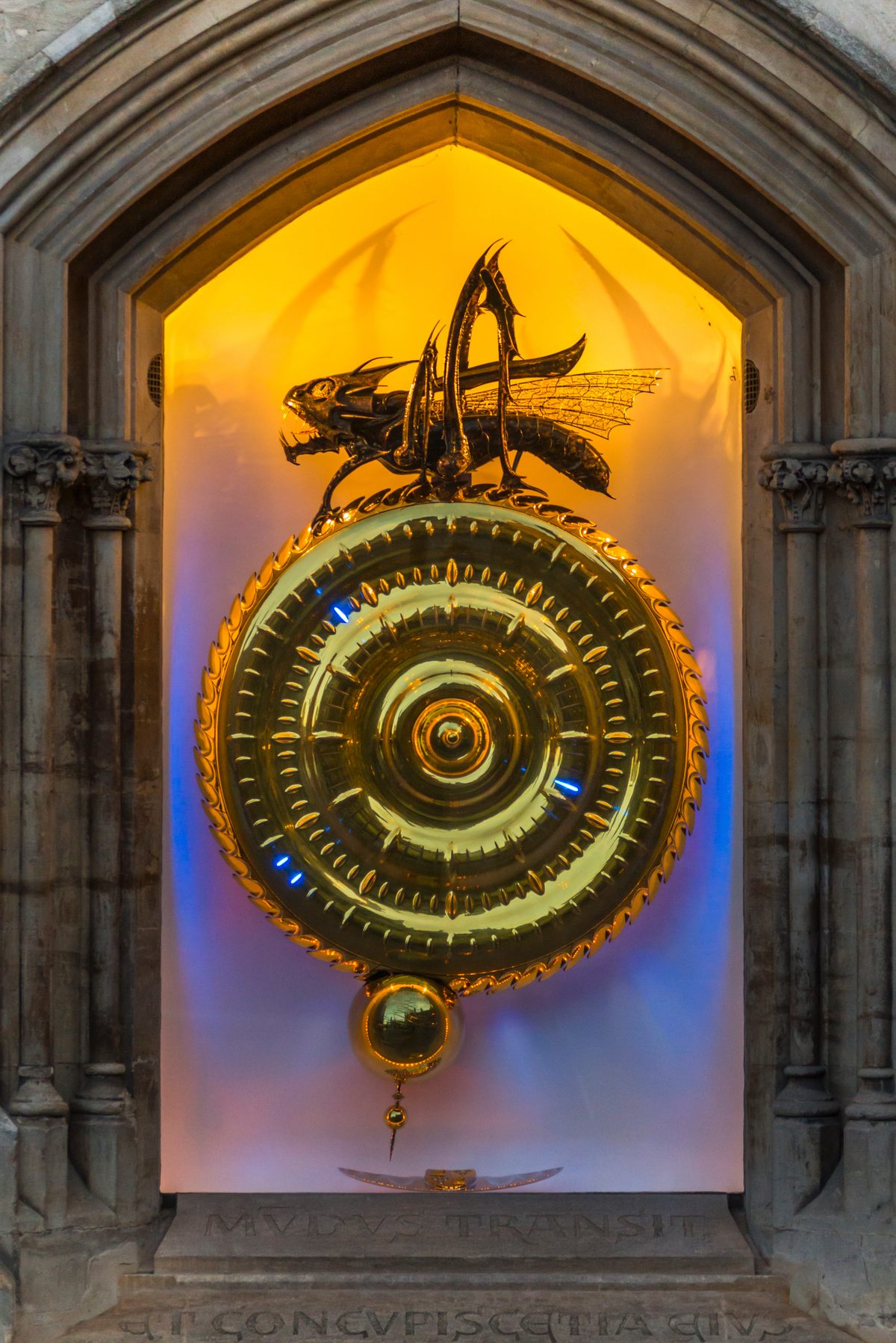As one walks down the street known as King’s Parade in Cambridge, just outside Corpus Christi college you will see a rather remarkable clock. There many strange features to this clock but the most striking and disturbing is the creature that stretches itself across the top. This is the chronophage – the “time-eater”. As the seconds turn the outer circle, this locust-like monster crawls along with mouth open, as if it is devouring every second. Periodically, its jaws will snap shut and its eyes will close in satisfaction as he swallows a minute or two. The clock limps along irregularly—stalling sometimes, sometimes speeding forward—like our own experience of life. Only every five minutes can it be trusted to tell the time accurately. And then on the hour, instead of a chime, the sound of a chain dragging across a coffin appears. At the base of this gilded disc is carved in stone, Latin words from 1 John 2:17, “mundus transit et concupiscentia eius” – “the world is passing away as are its desires.” The designer and donor of the clock, John Taylor, sums up the symbolism pretty clearly, “Basically I view time as not on your side. He’ll eat up every minute of your life, and as soon as one has gone he’s salivating for the next.”

Taylor’s pessimism about time is not unique and has a long history. In ancient Greece, Chronos was the Greek god of “time” and was often associated with Kronos, the mythological king of the Titans who castrated his father and ate all his children. Depicted as an old man with a sickle – Chronos or Father time, dispatches the past and devours the future. Only in the last century have we domesticated these images into a doting old man and a spry baby new year.
Throughout the year we tend to think of time as a thing, as a commodity that we have can more or less of. “Do you have time” … “I’m running out of time” … “I wish we had more time” … “there isn’t enough time”. But when we come upon days like these—New Year’s or other commemorative moments like birthdays and anniversaries, we tend to look at time differently—as something that has us, something that grasps us and carries us along, never pausing. Even though our planetary orb keeps spinning and soaring around our sun without stopping, and even though the cycle of seasons roll on unbroken, one right after another … we feel like, on these days, we need to pause for a moment, to catch our breath, and to reflect.
O.P. Kretzmann, past president of Valparaiso University, wrote about this on one of his birthdays:
“We divide our days into morning and evening and hours. . . . We must do that, of course, because life and time change. . . . There is nothing static about them.. .. We never stand still…. As a consequence there must be these artificially created moments when we suddenly become aware of the fact that something old is past and done and something new has begun.” (The Cresset (Vol. XIV, No. 7), 10)
He then goes on to wonder,
“Is it perhaps true that one legitimate and valid division of humanity would be between those who see life and history continuously and forever in terms of endings and those who see them constantly in terms of beginnings? … Perhaps that divides us definitely more than anything beyond the great gulf between faith and unbelief. … There are those who linger regretfully over the ashes of the past, and there are those who look hopefully for a new and flaming dawn, no matter how dark the night and how bitter the circumstances of the present.” (The Cresset (Vol. XIV, No. 7), 10-11).
The apostle Paul saw this division between two kinds of people cutting across the Christians in Galatia. After he had preached the gospel to the Galatians, other teachers came and convinced them that the old law of Moses was still in force, even though they had been baptized into Christ and had been given the gift of God’s Spirit. Circumcision, the dietary laws, and those old calendars that observed with feast and festival the ceaseless cycle of “days and months and seasons and years” (Gal. 4:10)—these were the kind of things over which they lingered. Even though the gospel had come, the Galatians were acting like nothing had really changed … that the world was still the same old world, with the same seconds and minutes, devoured one at a time. They were still “under the law” – not just the law of Moses but the old inviable, interminable, inexorable law of vanity … the relentless meeting out of life’s chances and tragedies … mistakes and missed opportunities … disappointments and injustices … until each final hour came, not with chime or song but with the creaking of a coffin shut.
But if this law was still in force … if this law had not come to an end, then this would mean that the gospel wasn’t really the gospel at all! For Paul had preached the good news that God’s eternal kingdom of righteousness and forgiveness had come, that with the coming of Jesus a new creation had dawned. But the Galatians were living in the past, and that as long as they lived there, they would not be able to experience the bright future that was already coming. And so Paul wrote to them of endings and beginnings, of time and eternity, of the passing of the old and the breaking in of new.
This temptation to live in the past is not unique to the Galatians. All of us feel this pull, when the power of the past shapes our experience of the present. It feels inescapable–we all have to live with the consequences of our choices and our mistakes. We all deal with levels of regret for paths not taken, or words not said. We all have to cope with fears forged sometimes when we were only children.
But the past that dominates over us stretches back further than our own lives. We live with the sins of our fathers. For example, in our city of St. Louis alone we can see the affects on our schools and neighborhoods of decisions made 100 years ago—redlining, blacklisting policies before we were born have created economic and spatial inequality that defines our city to this day. Conflicts local, and national, and global have roots that stretch back decades if not centuries! And, of course, our Scriptures point us back even further. From the time of the first man and the first transgression, sin and death have reigned over humanity—every murder, every war, every violence, every hatred—this is our inheritance “under the law.”
But then Paul writes:
“But when the fullness of time had come, God sent forth his Son, born of woman, born under the law, to redeem those who were under the law, so that we might receive adoption as sons. And because you are sons, God has sent the Spirit of his Son into our hearts, crying, “Abba! Father!” So you are no longer a slave, but a son, and if a son, then an heir through God.” (Gal. 4:4-7)
In the “fullness of time”—time had finally devoured enough … gorged and glutted … time, for the first time, would be full. Born under that same law where we cannot escape our past, where we were imprisoned by the relentless reach of our sin, God’s Son satisfied the law. Time inexorable and the Law insatiable, with mouth wide to devour one more individual “born of a woman,” swallowed he who could not be contained. Isn’t this in fact what we celebrate, marvel at during Christmas—that God himself in boundless immensity in lowly manger lies? Such is the wonder of the shepherds in Richard Crashaw’s Christmas poem, who kneel before the manger and say:

Welcome all wonders in one sight !
Eternity shut in a span!
Summer in winter! Day in night!
Heaven in earth! And God in man!
Great little one, whose all-embracing birth
Lifts earth to Heaven, stoops Heaven to earth!
“In the fullness of time” … Jesus Christ has brought the tyranny of the past to an end. Sins from the first man to the last–Christ bore them all on the cross; they were all crucified with him. So it was that he put an end to their power, and at his rising again the end of death’s power too. Our inheritance is no longer the sins of our fathers, but the eternal love of our heavenly Father, present already now by the gift of his Spirit. In Christ, we have a new “today.” No more need our days be shaped by the fears and regrets of time past. We are not slaves to these things any more, we are children of God!
Now, of course, the pull is still there. We still see and feel the consequences of our past (and even our present) sins all around us. Time still snaps its jaws. To live as children of God is not to ignore these things. Even when we gather to worship we begin by remembering the sins of our past and confess them. But we do no linger here. We press forward … from “Lord have mercy” to “Glory to God in the highest” … from “this is the Old Testament lesson” to “this is the Gospel of the Lord” … from “hear our prayer” to “lift up your hearts”! The old world is passing away—that clock in Cambridge is right– but we do not invest in it. Our days are determined by the hope and freedom of a future promised to us with the surety of a bright and flaming dawn. For neither days or months or years count for anything, nor even the New Year, but only a new creation.


Leave a Reply
You must be logged in to post a comment.